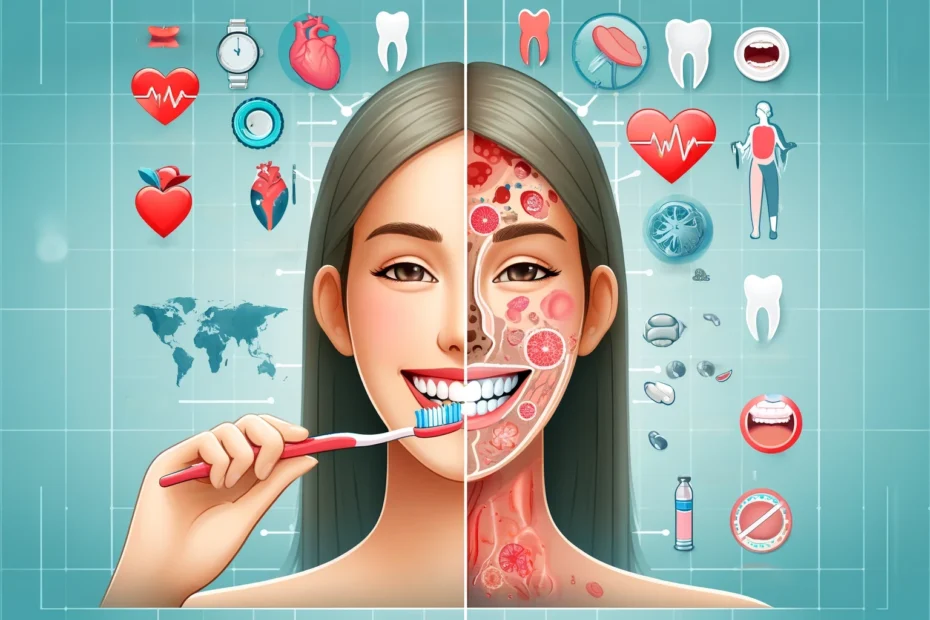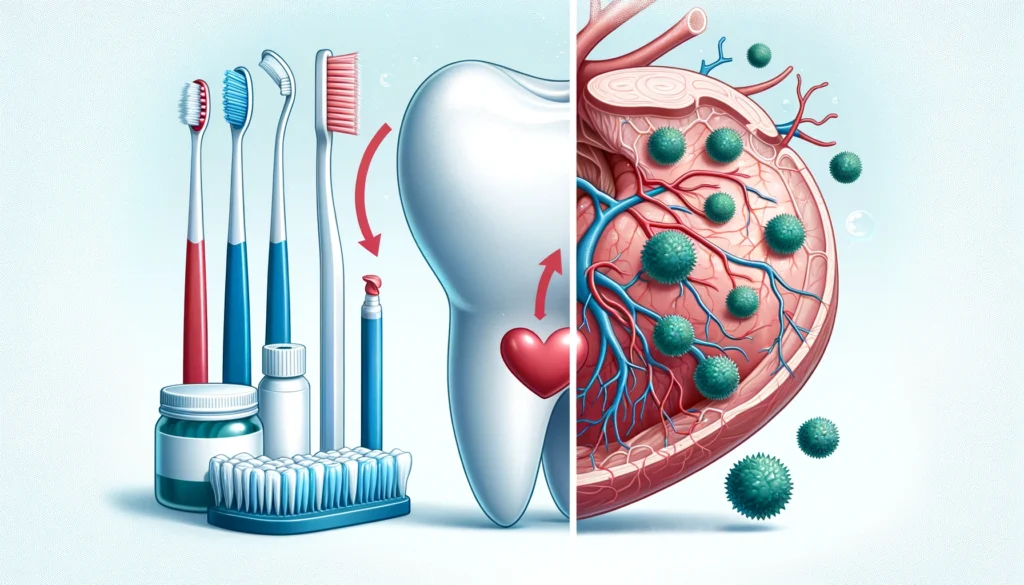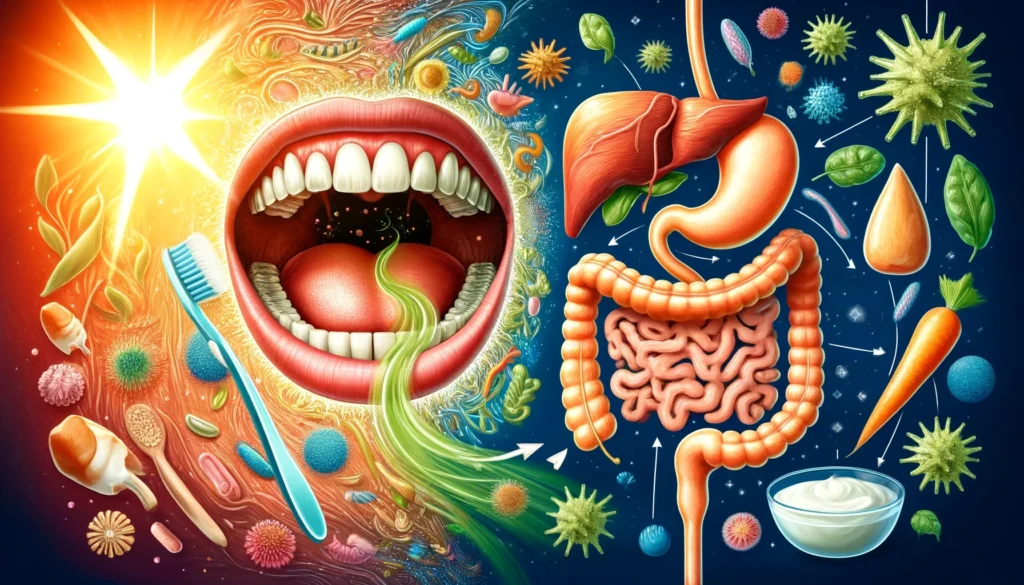Oral hygiene, often considered a routine part of daily life, holds profound implications for overall health. While its primary goal is to maintain the cleanliness and health of the mouth, its effects ripple throughout the entire body. The mouth, the gateway to the body, can influence various systemic conditions, making oral hygiene a critical aspect of general wellness.
The Importance of Oral Hygiene
Oral hygiene encompasses practices aimed at keeping the mouth clean and disease-free. This includes regular brushing, flossing, and the use of antiseptic mouthwashes. Beyond preventing cavities and gum disease, these practices are essential in mitigating the risk of systemic health issues.
Maintaining oral health involves a combination of proper techniques and consistent habits. Brushing at least twice daily with fluoride toothpaste, flossing to remove interdental plaque, and routine dental check-ups are fundamental. These practices preserve oral health and play a significant role in preventing systemic diseases.
Oral Hygiene and Cardiovascular Health
Emerging research highlights a robust connection between periodontal disease and cardiovascular conditions. Gum disease, characterized by chronic inflammation and infection, can contribute to the development of atherosclerosis and increase the risk of heart attacks and strokes. Chronic inflammation from gum disease releases harmful substances into the bloodstream, which can damage the blood vessels and heart tissues, facilitating the progression of cardiovascular diseases.
Individuals with severe periodontal disease have a higher incidence of coronary artery disease compared to those with healthy gums. The inflammatory response triggered by gum infections can lead to the thickening of arterial walls, restricting blood flow and raising blood pressure. Consequently, maintaining good oral hygiene is not just about preventing cavities but also safeguarding heart health.
Mechanisms of Oral Bacteria Affecting Cardiovascular System
- Oral bacteria, particularly those involved in periodontal infections, can enter the bloodstream and attach to fatty deposits in the heart’s blood vessels, leading to clot formation. This bacterial invasion triggers an inflammatory response, exacerbating cardiovascular conditions and illustrating the far-reaching impact of oral hygiene on heart health.
- Moreover, these bacteria can induce the formation of plaques in the arteries, further narrowing the blood vessels and impeding blood flow, which increases the likelihood of heart attacks and strokes.
The presence of periodontal pathogens in arterial plaques underscores the direct impact of oral bacteria on cardiovascular health. This connection emphasizes integrating oral health practices into cardiovascular disease prevention strategies.
Oral Health’s Impact on Respiratory System
Poor oral hygiene can lead to respiratory infections such as pneumonia. Inhalation of bacteria from infected teeth and gums can cause or worsen lung conditions. The elderly and those with compromised immune systems are particularly vulnerable to these infections.
Oral bacteria can be aspirated into the lower respiratory tract, leading to infections and inflammation, complicating pre-existing respiratory conditions, and increasing morbidity and mortality rates.
Individuals with periodontal disease are at a higher risk of developing respiratory diseases, including chronic bronchitis and emphysema. The inflammation caused by oral bacteria can weaken the respiratory system’s defenses, making it more susceptible to infections. This highlights the critical importance of maintaining oral hygiene to support respiratory health.
Conditions Exacerbated by Poor Oral Hygiene
Poor oral health can aggravate chronic obstructive pulmonary disease (COPD) and other respiratory disorders.
- Oral bacteria can exacerbate inflammation in the airways, leading to increased severity of respiratory symptoms and complications. The presence of periodontal pathogens in the respiratory tract can trigger a heightened immune response, causing further damage to lung tissues and exacerbating the symptoms of COPD.
- Additionally, poor oral hygiene can lead to the accumulation of biofilm and bacteria, which can act as reservoirs for respiratory pathogens. This can result in recurrent respiratory infections and a decline in lung function over time.
Therefore, maintaining good oral hygiene is essential for preventing respiratory complications and improving the overall quality of life for individuals with respiratory conditions.
- Diabetes and periodontal disease share a bidirectional relationship. High blood sugar levels can lead to an increased risk of gum disease.
- In contrast, severe gum infections can further impair blood sugar control, creating a vicious cycle that complicates the management of both conditions.
Due to their compromised immune response and reduced healing capacity, diabetic individuals are more susceptible to infections, including periodontal disease. Moreover, the inflammation caused by periodontal disease can increase insulin resistance, making it more difficult for diabetic patients to regulate their blood sugar levels.
This interplay between diabetes and oral health underscores the importance of integrated care approaches that address both conditions simultaneously. Effective management of gum disease can lead to better glycemic control and overall health outcomes for diabetic patients.
Managing Oral Health in Diabetic Patients
For individuals with diabetes, meticulous oral hygiene is crucial.
- Regular dental visits, effective plaque control, and management of blood sugar levels are essential strategies for preventing oral health complications and improving overall disease management.
- Diabetic patients should be particularly vigilant about oral hygiene practices, including brushing and flossing regularly, to reduce the risk of periodontal disease.
- Additionally, healthcare providers should emphasize the importance of oral health as part of diabetes management plans.
- Education on the links between oral health and diabetes and proactive dental care can help diabetic patients maintain better oral and overall health.
- Collaboration between medical and dental professionals is vital in providing comprehensive care that addresses the interconnected nature of these conditions.
Oral Hygiene and Pregnancy Outcomes
Periodontal disease during pregnancy is associated with adverse outcomes such as preterm birth and low birth weight. Inflammatory mediators from gum infections can enter the bloodstream and affect the developing fetus, emphasizing the need for proactive oral care during pregnancy.
Expectant mothers should prioritize oral hygiene to mitigate these risks. This includes routine dental visits, professional cleanings, and diligent home care practices to maintain oral health and support a healthy pregnancy.
Oral Hygiene and Digestive Health
The mouth is the starting point of the digestive system, where digestion begins with food’s mechanical breakdown and saliva’s enzymatic action. Poor oral health can disrupt this process, leading to inadequate digestion and nutrient absorption.
Oral infections and diseases can contribute to digestive issues such as gastritis and irritable bowel syndrome. Harmful bacteria and chronic inflammation in the mouth can affect the entire digestive tract, highlighting the interconnectedness of oral and digestive health. The following are tips that are helpful for oral hygiene to improve digestive health.
- Regular brushing and flossing help eliminate food particles and plaque that harbor harmful bacteria. These bacteria can cause oral infections, which can lead to digestive problems when swallowed. Maintaining oral hygiene reduces the risk of transferring pathogens to the digestive system.
- Incorporating an antibacterial mouthwash into your daily routine can help reduce oral bacteria that cause gum disease and infections. Lowering the bacterial load in the mouth minimizes the risk of these bacteria entering the digestive tract and causing issues.
- A fiber-rich diet, including fruits, vegetables, and whole grains, supports oral and digestive health. Fiber helps clean teeth and gums, reducing the risk of oral infections. Additionally, fiber aids in proper digestion and prevents gastrointestinal issues such as constipation and irritable bowel syndrome.
Psychological and Social Effects of Oral Health
Oral health significantly impacts self-esteem and mental well-being. Dental issues can cause discomfort and pain, leading to reduced confidence and social withdrawal. Conversely, a healthy smile can enhance self-esteem and overall mental health.
Oral health problems can hinder social interactions and affect personal and professional relationships. Bad breath, missing teeth, and visible decay can lead to embarrassment and isolation, underlining the importance of oral hygiene in maintaining a high quality of life.
Conclusion
Oral hygiene is more than maintaining a bright smile; it is integral to overall health. From cardiovascular and respiratory systems to digestive health and psychological well-being, the effects of oral hygiene are profound and far-reaching.
Regular oral hygiene practices are a simple yet powerful way to enhance overall health. By maintaining a consistent routine and seeking professional dental care, individuals can protect themselves against many health issues and improve their quality of life.

Dr. Orion Johnson is a dedicated and compassionate dentist committed to providing exceptional dental care to his patients.Dr. Johnson obtained his Doctor of Dental Surgery (DDS) degree from a prestigious dental school, where he excelled academically and clinically. He is licensed to practice dentistry and stays updated with the technology through continuing education and training.


